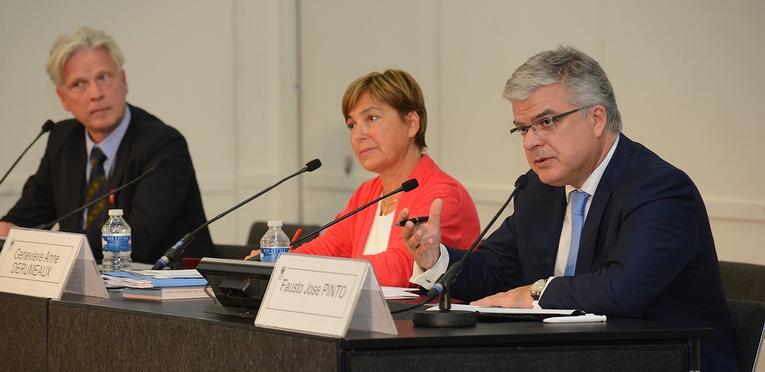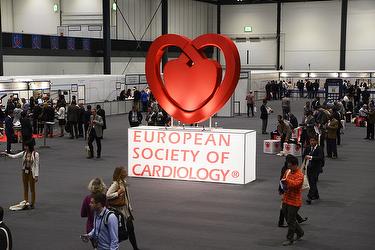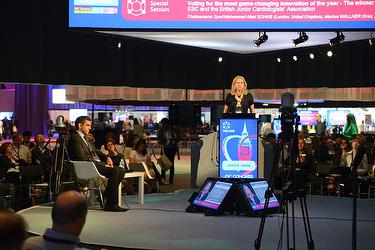
HIGHLIGHTS of ESC Congress 2015
- PATHWAY – 2: Confirmed benefit of spironolactone for resistant hypertension
- Pollution increases cardiovascular (CVD) risk
- Use of technology allows more interaction between participants and presenters
London, 2 September 2015: With 32,773 registrations this year (1), ESC Congress 2015 broke yet another record in attendance. “We are proud to have brought together so many delegates and the latest research from all over the world,” said ESC President, Professor Fausto Pinto, from Portugal.
“By 2030, 40% of Europeans will suffer from some form of CVD,” said Prof Fausto Pinto, ESC President, “so what is going on in our congress is relevant to everyone, not only health professionals.” (2)
Despite improvements in mortality and morbidity, CVD remains the main killer in Europe (1), especially for women, costing the European economy 200 billion euros every year.
ESC Congress 2015 closes its doors today after five packed days of science. With 28 clinical Hot Line presentations, 18 Clinical Trial Updates, 20 Registry studies, five new Guidelines and 4533 abstracts being presented, the ESC Congress 2015 was a resounding success.
 Prof Geneviève Derumeaux, Chair of the Congress Programme Committee said:
Prof Geneviève Derumeaux, Chair of the Congress Programme Committee said:
“ESC Congress 2015 has broken records in attendance! This reflects the excellent scientific content submitted to our congress. Cardiologists and other health professionals continue to see ESC Congress as “the” place to be in order to keep up to date with latest developments in cardiology and to meet experts from different fields of research and from all over the world.”
“If I had to highlight one study, I would quote PATHWAY 2 on the use of spironolactone for resistant hypertension (3)” said Prof Derumeaux. “This is a very renowned drug that has been around for years. It offers hope to patients with resistant hypertension, after the disappointing results of other treatments for this disease. Spironolactone has been tried in the real world, is available everywhere and is not expensive. PATHWAY – 2 sends a positive message about the use of traditional, well known drugs and will have significant implications for clinical practice.”
Other important studies presented at ESC Congress 2015 were:
- The Leadless II trial, showing that a leadless cardiac pacemaker demonstrated to be safe and reliable Slides -- Press release
- The BACC trial showing that patients arriving at the emergency department with chest pain suggestive of acute myocardial infarction (AMI) can be triaged more quickly and more safely using a new rapid assay with refined cut-offs, German research suggests. This confirms the recent update of ESC NSTEMI guidelines Slides -- Press release
- PRESERVATION I trial: An investigational material known as Bioabsorbable Cardiac Matrix (BCM) that is injected through the coronary artery to prevent cardiac remodelling in heart attack patients had no significant effect compared to a saline placebo Slides -- Press release
- CIRCUS trial showing that cyclosporine before PCI did not improve clinical outcomes in patients with anterior STEMI Slides -- Press release
“The wealth of new information in the scientific programme was reflected in the very dense press programme this year,” said Steen Kristensen, Chair of the ESC Press Committee. “Over 590 journalists registered for ESC Congress 2015 and many more followed the congress from afar. We have had coverage from China to Brazil.”
“Hot Lines are always the main focus of media attention and are reported all over the world. The ESC Congress is a great source of news for medical, financial and lay media.”
Some of the most popular news stories coming out of ESC Congress (apart from Hot Lines) this year were:
- The benefits of naps - Midday naps are associated with reduced blood pressure levels and prescription of fewer antihypertensive medications Slides -- Press release
- Prolonged television watchers have a higher risk of fatal pulmonary embolism, a condition associated with long haul flights
Slides -- Press release - Pollution and CVD - studies show that particulate matter and NO2 air pollution are associated with increased risk of severe heart attacks despite being within European recommended levels Slides -- Press release
“ESC Congress 2015 was about opening our eyes and opening our minds,” said Prof Derumeaux. “We chose to enlarge our scope this year by highlighting the interaction between the environment and the heart and particularly pollution as a risk factor for CVD. Some of these “new” risk factors will become more and more important. In this sense, I would also like to highlight Prof Elizabeth Blackburn’s (2009 Nobel Prize) thought-provoking presentations on premature ageing, showing the effects of stress on genes and, ultimately, on longevity.”
 “Not many people know about the link between pollution and CVD. The environment is not something individuals control. It is an issue that needs to be addressed by politicians and companies. Members of the public can play a role though, in lobbying for change,” said ESC Press Committee Chair, Prof Steen Kristensen, from Denmark. “This is why the ESC has launched a call to action which anyone can join by signing the ESC petition”. Sign the petition here
“Not many people know about the link between pollution and CVD. The environment is not something individuals control. It is an issue that needs to be addressed by politicians and companies. Members of the public can play a role though, in lobbying for change,” said ESC Press Committee Chair, Prof Steen Kristensen, from Denmark. “This is why the ESC has launched a call to action which anyone can join by signing the ESC petition”. Sign the petition here
“Death from CVD has declined but we should not become complacent,” said Prof Pinto. “Heart failure, for example, is on the rise and together with other areas of cardiology, warrants more research. The ESC will continue to advocate for more innovation in cardiology.”
“As we leave London, we are already preparing for ESC Congress 2016 which will take place in Rome, Italy, from 27 to 31 August 2016,” concluded Prof Pinto.
Ci vediamo a Roma!

 Our mission: To reduce the burden of cardiovascular disease.
Our mission: To reduce the burden of cardiovascular disease.